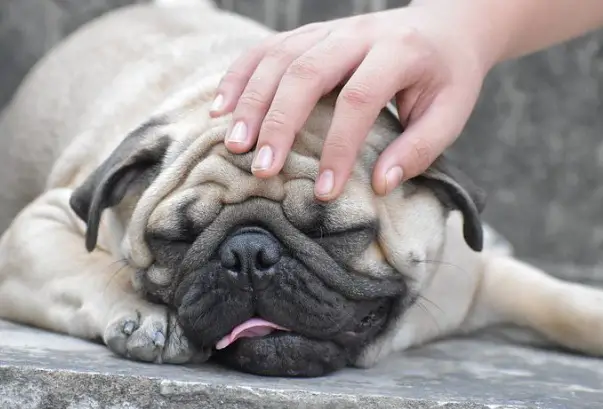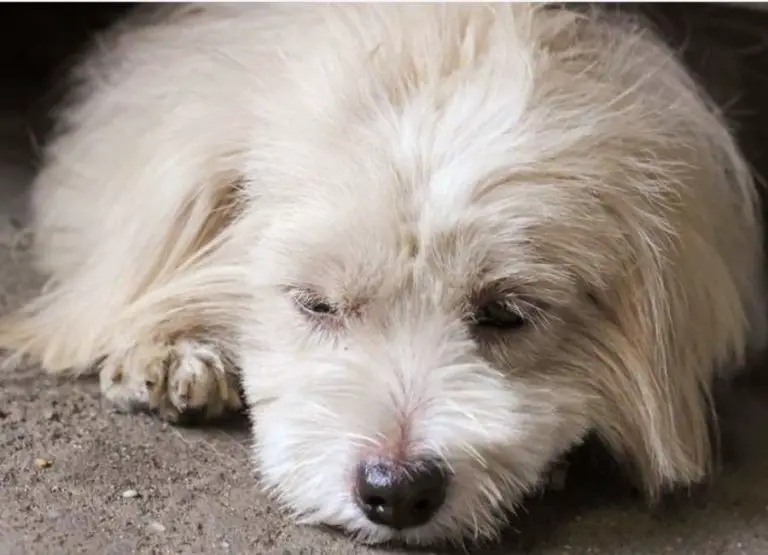17 Potential Causes Of Anxiety In Dogs You Should Know

Anxiety in dogs is one of the common problems most dog owners face, so what are the causes of anxiety in dogs? Keep reading to find out our thoughts…
Dealing with anxiety in dogs can be quite difficult if you can’t figure out what really caused your dog’s anxiety.
Finding out the common causes of anxiety in dogs can help you prevent unnecessary behaviors that come with dog anxiety.
As a dog owner with years of experience, I will be discussing most of the common causes of anxiety in dogs.
So let’s discuss…
Causes Of Anxiety In Dogs
Causes of anxiety in dogs are a big deal for inexperienced dog owners.
Knowing the most common causes of anxiety in dogs should help you avoid or prevent them.
Here are some of the most common causes of anxiety in dogs:
1. Lack of exercise causes anxiety in dogs
Dogs are active animals that require some form of exercise daily, especially for hunting or herding dogs.
According to research in the journal “Applied Animal Behavior Science,” consistently exercising dogs showed less anxiety and hostility than those who did not.
According to this study, giving your dog regular exercise might assist to lessen anxiety and enhance their general welfare.
Exercise has also been proved to aid with mood and temperament in your dog.
When given the chance to exercise, dogs release endorphins, which are linked to emotions of enjoyment and wellbeing.
Therefore, giving your dog frequent exercise might aid in lowering dog anxiety.
Dogs are social creatures and require socialization to have happy and healthy lives.
Insufficient socializing can make pets anxious. Dogs frequently experience anxiety, which can be brought on by a number of factors, such as a lack of socialization.
There are a few things you can do to help if your dog is worried.
First, make an effort to provide him as much socializing as you can.
This entails exposing him to a range of individuals, creatures, and circumstances.
In order to keep him engaged, make sure he has a ton of toys and other things lot do.
Finally, show him some patience.
He could need some time to get used to his new way of life.
Read more: 12 Potential Reasons Dogs Wake Up At Night & Solutions.
3. Lack of trust between you and your dog
Anxiety and tension might result if you don’t trust your dog or if your dog doesn’t trust you in any scenario.
A dog may become uneasy and stressed out of fear of not being able to trust.
As a result, behaviors like barking, chewing, and even hostility may develop.
It’s crucial to be able to trust your dog and to get along well with them.
Speak to your veterinarian if you suspect that your dog is agitated or worried.
4. Lack of proper nutrition
One of the main reasons for anxiety in dogs is improper diet.
Dogs that do not receive the correct diet may experience tension and anxiety.
Aggression and other behavioral disorders are only a couple of the concerns that might result from this.
There are a few things you can do to aid if you’re worried that your dog’s nutrition may be insufficient.
First, make sure your dog is eating a high-quality, nutrient-rich meal.
To make sure your dog is getting all they need, you might also want to think about adding vitamins and minerals to their food.
Consult your veterinarian if you believe that your dog’s nervousness is due to malnutrition.
They may offer advice on the best ways to handle the situation and assist you in determining whether your dog is indeed deficient in nutrients.
5. Insufficient sleep causes anxiety in dogs
Your dog may have sleeplessness for a variety of causes, including stress, separation anxiety, and even some medical disorders.
There are a few things you can do to assist your dog in getting the rest they require if you believe that lack of sleep is the cause of their anxiety.
Make sure their resting space is first calm and pleasant.
This entails removing any potential sources of noise or light that can keep them awake.
A relaxing night ritual may also be used to aid in their relaxation.
You might wish to discuss potential medical issues with your doctor if your dog is still having problems falling asleep.
Read more: 12 Tips On How To Stop My Dog From Barking At Other Dogs.
6. Anxiety caused by diseases or injuries
Dogs might get anxious due to a variety of illnesses and wounds. Among the most typical ones are:
-Arthritis: This degenerative joint disease, which is common in older dogs, can be painful and stiff.
Your dog may find it difficult to move around as a result, which may cause anxiety.
-Cancer: Receiving a cancer diagnosis can be terrifying for both you and your dog.
Treatment can be challenging, and the uncertainty can be very stressful.
-Injuries: Dogs that are injured or have been in accidents frequently develop anxiety.
This is especially true if the dog had to undergo extensive care or if the damage was serious.
-Loss of a Loved One: If your dog has lost a friend, either a person or another animal, they could feel distressed.
This is particularly true if they are in close proximity to the person or creature.
There are several health issues that might be correlated with your dog’s anxiety if it is present.
7. Chronic stress can cause anxiety in dogs
Similar to people, dogs can develop anxiety from prolonged stress.
Dogs with ongoing anxiety may begin to display indications of fear or hostility.
It’s crucial to consult your veterinarian if your dog exhibits indications of anxiety in order to rule out any medical causes and to create a strategy for making your dog feel more at ease.
Here are things that can cause chronic stress that leads to anxiety in dogs:
- Constant changing of daily routine
- Being around strange people.
- Birth of a new child.
- Bringing in a new pet.
- Change of location.
- Loud noises.
- Frequent changes in mealtimes.
8. Genetics causes anxiety in dogs
The relationship between genetics and canine anxiety is a subject of intense discussion.
While some scientists contend that heredity might contribute to anxiety, others contend that environmental factors are the primary culprits.
However, there isn’t a certain agreement on the subject.
However, it is evident that anxiety may be a significant issue for dogs.
It might be challenging to control your dog’s behavior and maintain their composure if they are worried.
Aggression, destructive conduct, and even separation anxiety are all possible outcomes of this.
There are many methods to assist your dog in dealing with anxiety, but before you can decide on the best course of action, it’s critical to comprehend the underlying source of the issue.
Consult your veterinarian about the best course of action if you suspect that your dog’s anxiety may be influenced by heredity.
9. Body-conditioning issues cause anxiety in dogs
There are several possible body-conditioning problems that might make dogs anxious.
Obesity, poor nutrition, dehydration, and even heat exhaustion are examples of these.
Each of these concerns may result in a variety of health problems, which may then contribute to anxiety.
For instance, obesity may cause joint issues, which can be excruciatingly uncomfortable.
A dog may feel uncomfortable and stressed because they are unable to roam about as much as they would want.
Weakness and weariness are only a couple of the health issues that can result from malnutrition.
A dog may find it challenging to continue with their regular activities as a result, which may cause anxiety.
Dogs that are dehydrated may also experience anxiety. This is because a variety of neurological issues can result from dehydration.
Seizures, which may be quite terrifying for a dog, can result from inadequate brain hydration.
Due to panting and other health issues that may be uncomfortable for your dog, heat exhaustion can also result in anxiety.
10. Restlessness causes anxiety in dogs
If your dog is agitated, it could be anxious.
Dogs can experience anxiety for a number of causes, such as environmental changes, being away from their owners, and dread of loud noises.
It’s crucial to speak with your veterinarian if your dog exhibits symptoms of anxiety, such as pacing, panting, or barking, in order to rule out any underlying medical conditions and to create a treatment plan.
11. Constant changing of daily routine
Your dog probably dislikes changing if they’re anything like mine.
Anxiety and worry can be brought on by even the slightest shift in daily routine.
Change is unavoidable in our hectic life, which is unfortunate.
Change is a part of life, whether it’s a shift in the weather, a new resident moving in, or something as basic as a new dish.
While change may not be difficult for us, it can be really difficult for our pets.
They don’t know how to deal with their world being flipped upside down.
All kinds of issues, such as destructive conduct and separation anxiety, may result from this.
There are a few things you can do to assist a dog who resists change if you’re dealing with one.
Try first to implement change gradually. Do not abruptly go if you intend to be gone for a considerable amount of time.
Spend some time letting your dog get used to the thought that you will be gone.
Second, make an effort to continue the habit you just established rather than moving to another one.
12. Fear of being home alone causes anxiety in dogs
Many dogs have separation anxiety because they are afraid of being left at home alone.
This anxiety is frequently brought on by a painful experience, including being abandoned or being apart from their owner.
Many other signs, including barking, howling, whining, pacing, destruction, and elimination, can be seen in dogs who are separation anxious.
It’s critical to seek assistance from a licensed veterinarian or animal behaviorist if your dog exhibits any of these symptoms.
Combining behavior change with medication is a common component of separation anxiety treatment.
13. Frequent changes in mealtimes
When you start changing your dog’s mealtimes after they’ve grown accustomed to eating at particular times of the day, it might make them anxious.
Dogs enjoy regularity and are creatures of habit.
When routines are disturbed, it can stress people out and potentially result in behavioral issues.
If necessary, gradually alter your dog’s mealtimes. Once you reach the ideal time, start by moving their meals forward by 15 minutes each day.
Your dog will be able to acclimate gradually and prevent any possible distress.
14. Bringing in a new pet
Although this situation might seem absurd to you, it actually happens frequently in families.
Dog hostility and a dog barking at other dogs are caused by dogs’ difficulty in trusting people or other animals.
When you introduce new animals or humans that they can’t immediately trust, most dogs grow envious and apprehensive.
Any new family member, whether a human being or a pet, must be appropriately introduced to prevent unneeded stress, despair, or separation anxiety.
A dog may engage in self-isolation if they don’t get along with a new pet or family member, which leads to separation anxiety.
15. A stressful or traumatic event
This is typical of dogs that have undergone a transfer of ownership or those that have been found at a shelter.
When a dog experiences trauma, such as being abandoned, turned into a shelter, or being adopted by a new family or guardian, separation anxiety can develop.
Even if you may speed up the process by engaging in specific behaviors or actions, when you adopt a dog from a shelter or from friends and family, the dog needs time to develop confidence in you.
Due to their past experiences, some dogs have severe separation anxiety, which will require time to treat or possibly require that you take the dog to a professional.
Separation anxiety can also be brought into your house by a dog that has experienced owner-passed cruelty.
16. Birth of a new child
The birth of a new child can cause your dog to be anxious and lead to frustration.
You should also understand that some breeds of dogs are jealous and wouldn’t want to compete for attention.
While you are pregnant let your dog know you will have a baby by allowing your dog to sniff your belly.
When the child is born, slowly introduce him to your dog, also don’t let your dog notice much change.
Read more: 17 Possible Reasons For Your Dog Acting Weird & Tips.
17. Change of location
Moving to a new location where your dog perceives it as a strange setting or changing your surroundings might make dogs experience separation anxiety.
There are several strategies to prepare your dog for a move to a new area or site in order to prevent needless behaviors that come with a new setting.
For instance, you must prepare your dog properly for crate training sessions and more if you intend to move.
The state of the new surroundings may lead your dog to lose faith in you, which might result in separation anxiety.
Read more: 10 Reasons Why Dogs Scratch Carpets And Walls (Explained).
Signs of anxiety in dogs
Here are some of the most common signs of anxiety in dogs:
- Pacing or shaking
- Whining
- Yawning, drooling, and licking
- Changes in eyes and ears
- Changes in body posture
- Barking or howling
- Panting and pacing
- Shivering and freezing.
- Cowering in the corner of a house
- Excessive digging
- Escaping the yard
- Destroying furniture
- Self-harm, including excessive licking or chewing




![Are Seizures Common in Beagles [Causes, Signs & Treatments] Are Seizures Common In Beagles](https://petcreeks.com/wp-content/uploads/2021/04/Are-Seizures-Common-In-Beagles.jpg)

